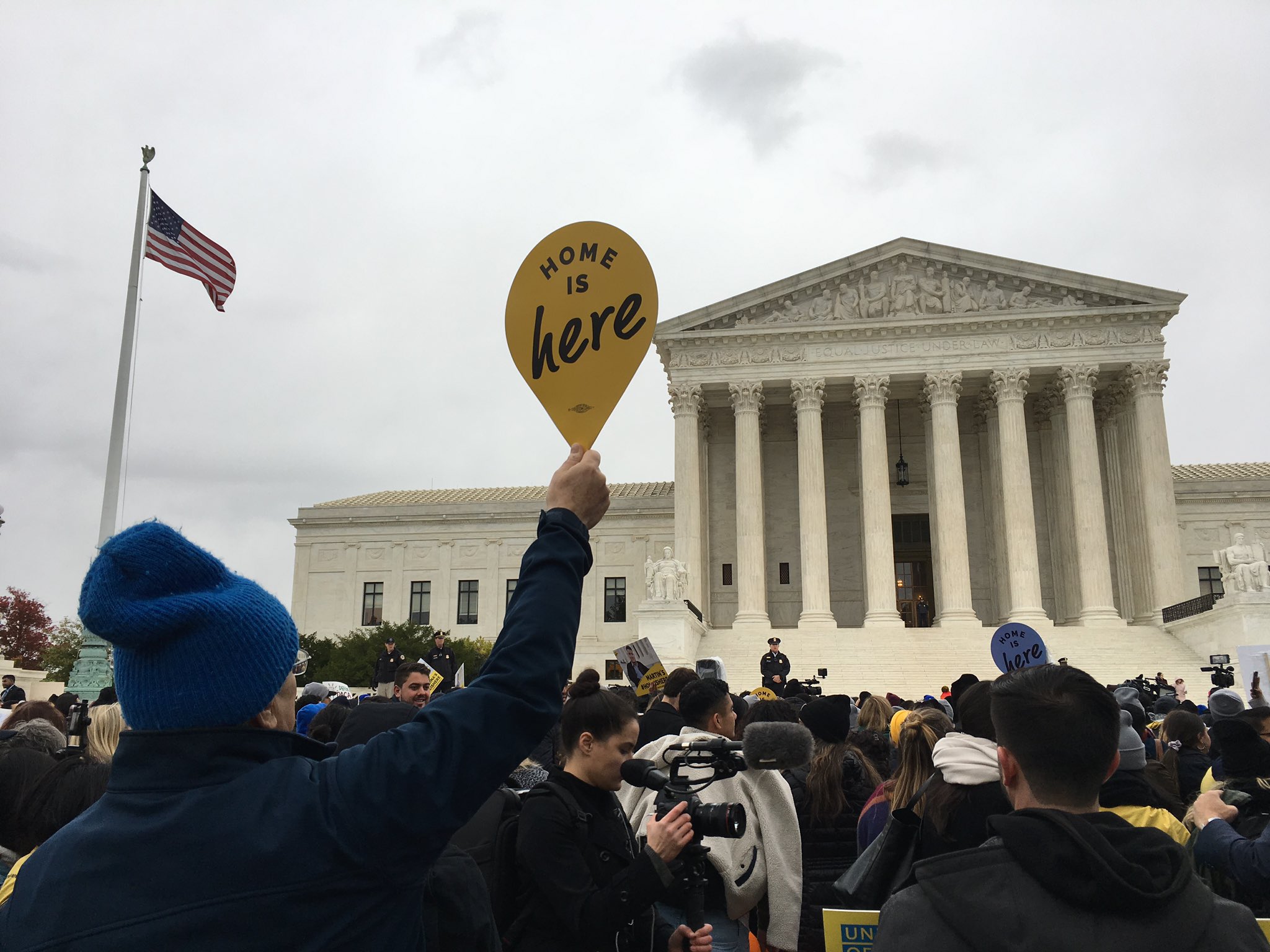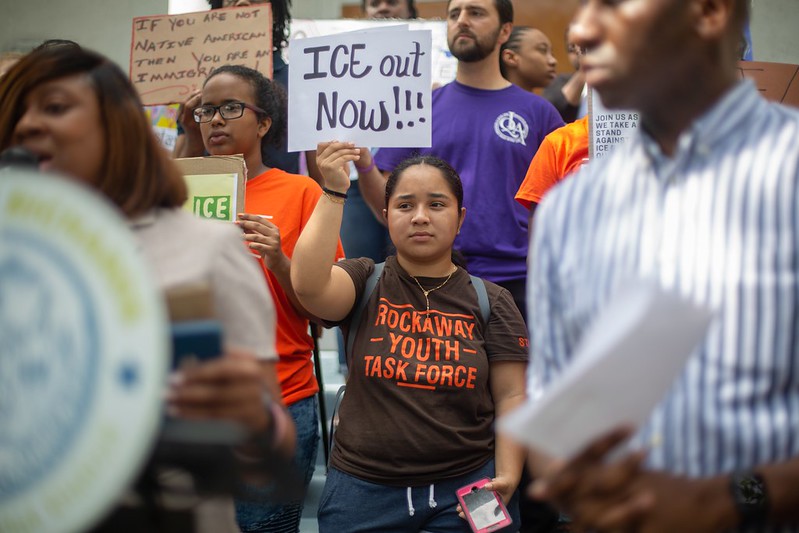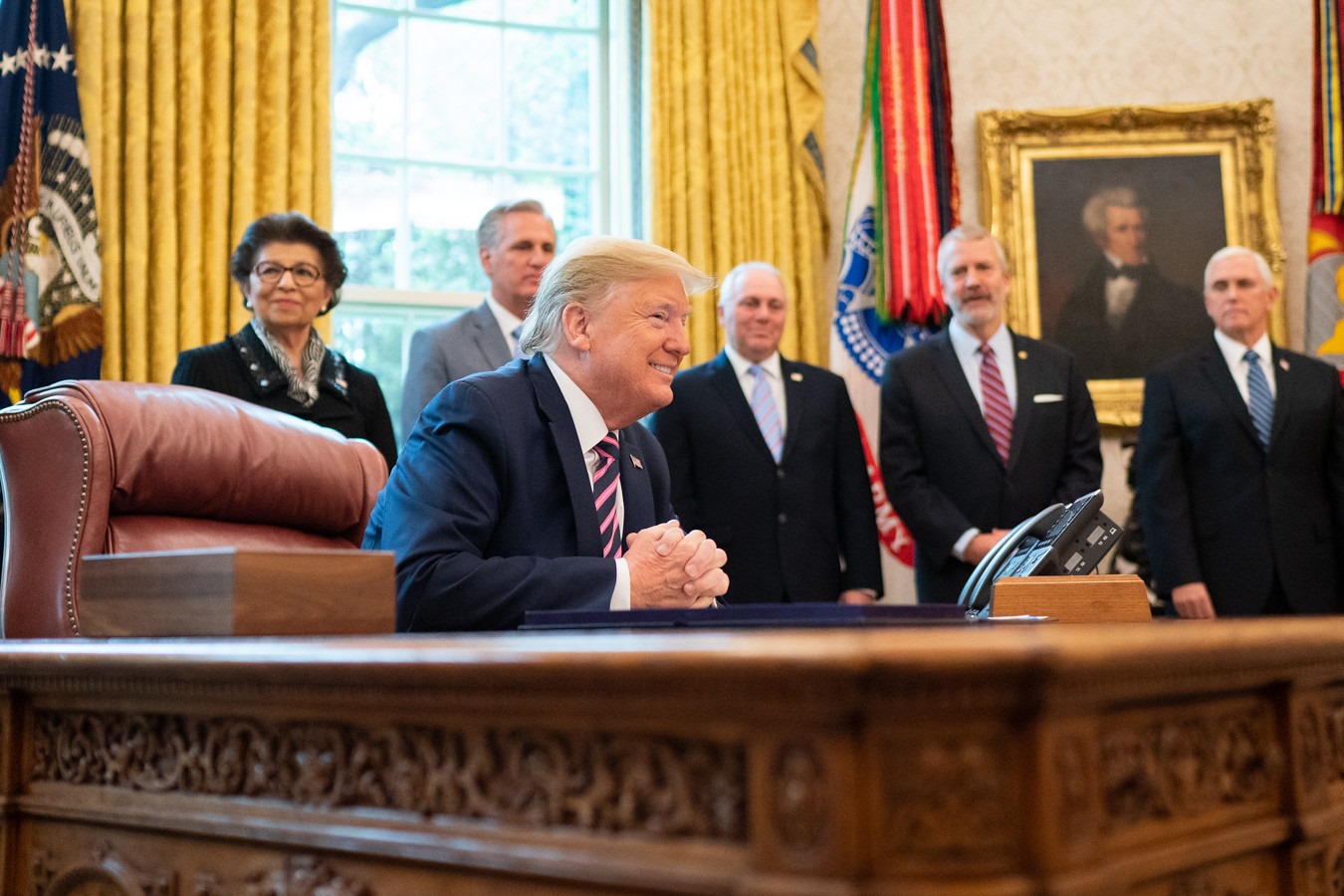3 Potential Outcomes SCOTUS Might Reach on DACA

SCOTUS will soon rule on DACA in some way (photo: @afsc_org)
Scores of facebook messages and emails fill my inbox each day from immigrant youth protected under the Deferred Action for Childhood Arrivals (DACA) program — the Obama-era initiative that provided work authorization and protection against deportation for undocumented immigrants brought to the country as children.
They ask the same question: what will the U.S. Supreme Court decide on DACA.
Any day now, the nine justices will answer this question that will decide the fate of 650,000 young people shielded under the program, with an estimated 30,000 in New York City. Before we turn to the potential outcomes, however, let’s first lay out what the Court is actually ruling on.
The Court is focusing on two questions in Trump v. Regents of the University of California et al. (the DACA case): whether the Court has authority to review President Trump’s decision to end DACA, and, if so, whether he followed proper procedures in terminating DACA.
The legal path the Court takes to reach its conclusion will be as important as what it ultimately concludes. Every footnote, word, and punctuation will be critical. There is, however, legal guidance that projects three potential outcomes:
SCOTUS: We don’t have authority over Trump’s decision to terminate DACA.
This means that a President has almost full control over DACA. The worst, and unlikely, scenario here would see the United States Citizenship and Immigration Services (USCIS) dismantling the program by immediately cancelling existing work permits and invalidating pending renewals.
Depending on any arrests or criminal record, Immigration Customs and Enforcement could detain and begin deportation proceedings against the person who is no longer protected by DACA.
Control over DACA could also mean that President Trump would use it as leverage for legislative bargaining. He would likely direct USCIS to continue work permits and deportation relief until he bargains with Congress for a deal, e.g. border wall in exchange for some form of legal status for Dreamers. Anything is possible in an election year.
Another scenario under this decision would also allow a potential Biden administration to reinstate DACA — maybe even create a broader DACA program that would allow international travel and facilitate a path to citizenship.
SCOTUS: We have authority and Trump’s decision to terminate DACA is unlawful.
Under this better scenario, the Administration would need to restart the entire program. Depending on what precisely the Court considers the “lawful way,” Trump could then correctly proceed — like following the steps of the Federal Administrative Procedure Act — to end the program.
According to the Government Accountability Office, the average time a federal agency takes to change agency rules is about four years. In the meantime, USCIS could allow renewals, new applications, and even foreign travel.
If the ruling is that the President lawfully ended the program, then the Court will revert discretion to the President on how and when it can end the program. The Court could place restrictions like allowing work permits to continue until they expire or at another stated expiration date (e.g. end of the national state of emergency due to COVID-19).
DACA is itself unlawful
Finally, if the Court concludes that DACA itself is unlawful, then the program will be terminated without the President taking further steps. Once again the Court could indicate how and when the program will be rolled back.
Living at the fault line of immigration policy has filled the lives of thousands of immigrant youth with uncertainty. I know how that feels. Still, having come out of the shadows, I know that Dreamers will not go back.
Their home is here. And they are here to stay.
****
Cesar Vargas is New York's first undocumented attorney and a national advocate for immigration reform. On Twitter @Dreamer_Esq.
***
Have an op-ed idea or submission for Gotham Gazette? Email This email address is being protected from spambots. You need JavaScript enabled to view it.
As Courts Reopen, Threat of ICE Returns: State Lawmakers Must Protect Our Neighbors

As courts in NY reopen, the role of ICE will be top of mind for many (photo: John McCarten/City Council)
Courthouses in 30 upstate New York counties have begun the gradual process of restarting the state’s legal system. The pandemic has highlighted the urgent need for due process and just how critical access to justice is for New York’s most vulnerable communities. There remain, however, significant barriers for many who desperately need their day in court.
For years, ICE has preyed on non-citizens in and around our courthouses, using fear and intimidation to limit access to justice for our communities. The Protect Our Courts Act would help ensure that all New Yorkers feel safe to access the courts by preventing ICE agents from detaining people in or around courthouses unless they have a signed judicial warrant.
Lawmakers in Albany must make the Protect Our Courts Act a priority if we are going to make the promise of equal justice under the law a reality in this time of crisis. Without this vital protection, we are likely to see a surge in ICE arrests that will effectively shut many of the most vulnerable New Yorkers out of the courts and heighten the risk of contagion for those detained. The Immigrant Defense Project (IDP) tracks ICE raids throughout the state, and in the first 11 weeks of 2020, raids in New York City increased 400% compared with the same period last year. When these arrests ramp up again, and they will, the same communities hardest hit by COVID-19 will have to endure another wave of attacks, mourning, and lives disappeared.
ICE has already used the courthouse to trap immigrants during the current crisis. On March 13, as President Trump declared a National Emergency, Mr. RC, a client of The Bronx Defenders, appeared in state court in Poughkeepsie. Despite the mounting pandemic and the deployment of state and federal resources to try to contain the virus and protect public health, six ICE officers entered the courthouse, defying Office of Court Administration rules promulgated last year, waited for Mr. RC outside the courtroom doors, and arrested him as he left his court appearance. None of the officers wore gloves, masks, or any other protective gear. ICE then detained Mr. RC at the Orange County Jail, increasing the likelihood of exposure and separating him from his fiancee and one-year-old as the worst period of the pandemic was just beginning.
Mr. RC’s experience is not an aberration. The Bronx Defenders has represented hundreds of individuals arrested under circumstances that demonstrate ICE’s disregard for the health, safety, and, indeed, the humanity of immigrants in New York. The tremendous health risks posed by detention centers have been well-documented. Detained immigrants have been holding hunger strikes, protesting, and filing lawsuits calling on ICE to end unnecessary and harmful detention. The last place anyone should be in the midst of this pandemic is a cage. At this critical moment, New York should embrace legislation that would limit ICE’s ability to pull more New Yorkers into its dragnet.
It is hard to imagine a worse time to punish and endanger immigrant New Yorkers. Every ICE arrest, detention, and deportation takes someone away from communities that have been pushed past the breaking point. The death rate for black and Latino people in New York City has been twice the rate for white people, and essential workers most at risk are disproportionately likely to be women, immigrants, black, and Latino. As people vanish from the neighborhood, loved ones are left turning over survival and grief in their hands as refrigerated trucks full of the deceased sit in parking lots nearby.
The Protect our Courts Act already has majority support in both chambers of the New York State Legislature. Now more than ever we cannot let ICE stand in the way of full access to public services, rights, and remedies, including those available at the courts, such as orders of protection, fighting evictions, seeking child support, and defending oneself against criminal charges. When ICE’s intentions to use our courts as a lure to detain immigrants at the outset of a pandemic are so clear, we must not wait to see how ICE will strike next before we act.
***
Mizue Aizeki is the deputy director of the Immigrant Defense Project. Rosa Cohen-Cruz is the Policy Counsel to the Immigration Practice of the Bronx Defenders. On Twitter @ImmDefense & @BronxDefenders.
***
Have an op-ed idea or submission for Gotham Gazette? Email This email address is being protected from spambots. You need JavaScript enabled to view it.
Trump Continues His Assault on Independent Oversight and Rule of Law

President Trump (photo: White House)
In late April, I wrote a guest column regarding President Donald Trump’s firing of a federal Inspector General, threats to other IGs and the rule of law, and how New York City’s inspectors general system is a model, with no city IG removed for doing their job. Over the last weeks Trump has escalated his war on the nation’s watchdogs as a way of “draining the swamp,” or, in reality, removing independent oversight of him and his administration.
The following is an update of Trump’s attack on the independence and integrity of IGs after unsupported firings of three inspectors general and a political juggling act removing another IG. A total of four federal IGs are gone, one of which Trump first chastised before firing. Now, all federal IGs must be looking over their shoulders at a lurking president.
The mission of all inspectors general is to provide independent, objective oversight to improve the integrity, accountability, and performance of our government and to improve government programs, in part by recommending corrective actions and promoting high standards.
The 1978 Inspector General Act, supported by six Democratic and Republican presidents, mandates the importance of independent oversight. Since April 3 President Donald Trump did a spring IG housecleaning, ending independent oversight with retaliatory firings of three IGs after publicly flogging one and replacing another.
All four IGs felt Trump’s wrath while protecting our nation. An abuse of presidential power unheard of in 42 years, now rocking our government to the core with threats and suppression of our nation’s watchdogs from ferreting out waste, cronyism, fraud, and corruption. It is an egregious assault on good government, integrity and independence, especially after Congress appropriated trillions to fight a pandemic.
On May 15, State Department Inspector General Steve Linick was fired. Linick was reportedly investigating Secretary of State Mike Pompeo for having a State political appointee perform personal tasks for Pompeo and his wife. (In New York City, that’s a violation of the City Charter.)
Additionally, at Congress’ request, Linick was investigating an $8 billion arms deal, bypassing Congressional review, with Saudi Arabia.
These two investigations were halted by Trump’s unfounded firing, as urged by Pompeo, the target of the IG’s investigation. Pompeo said of Linick’s termination, “Frankly, should've done it some time ago.” Trump ratified this manipulation, incredibly saying, "Never even heard of Linick," but fired him because Pompeo “asked me to terminate him” and Linick “no longer had my full confidence.”
This is not the first time Trump used the ridiculous 'never heard of him' response when he himself was linked to wrongdoing and clearly knew the individual involved.
For instance: Lev Parness, Rudy Giuliani’s crony tied to the Ukraine scandal; Gordon Sondland, Ambassador to the European Union, a major donor to the Trump inauguration committee and a key impeachment witness; and sex trafficking kingpin Jeffrey Epstein; among others.
In an obvious move to protect Pompeo and derail Linick’s investigations, Trump named Stephen Akard, an ambassador closely aligned to Vice President Mike Pence, as Linick’s IG replacement. It’s unclear how well Trump knows Akard.
Although Linick is the latest to be axed, the IG massacre started on April 3 with the firing of Trump’s own appointee, Michael Atkinson, who was Inspector General at the Office of the Director of National Intelligence, for disloyalty. Atkinson, investigated the whistleblower’s complaint alleging Trump pressured the Ukraine president to investigate presidential candidate Joe Biden’s son. Atkinson was fired for doing his job and not revealing the whistleblower’s identity.
Next was Christi Grimm, Health and Human Services’ Deputy Inspector General, who reported coronavirus shortages and testing delays at our nation’s hospitals. Trump loudly criticized Grimm, calling the IG’s report “fake” and insinuating, without support, Grimm’s report was politically motivated. Trump fired her.
Then there is Glenn Fine, the Department of Defense’s acting Inspector General, who was selected by a Council of IGs, based upon Fine’s credentials and DOD title, to serve as Congress’ coronavirus special IG, wisely established by Congress in the $2.2 trillion CARES Act to ensure funds are not misspent for coronavirus relief efforts. Evidently, alarm bells went off at the White House with this oversight temporarily vested in a special IG not appointed by the president.
Corrective action was required.
In a deft sleight of hand in the middle of the pandemic, Trump removed acting DoD IG Fine and replaced him with Sean O’Donnell, making O’Donnell the Council’s selection as the temporary coronavirus special IG since the appointment was tied to the DoD post, not the person. Additionally, O’Donnell continues to serve in two acting positions as Trump’s EPA IG and DoD IG.
Trump nominated Brian Miller as the permanent special inspector general for pandemic response – replacing O’Donnell – and the Republican majority Senate committee voted 14-11, recommending Miller’s confirmation to the full Senate.
Independence was the key watchword at Miller’s Senate confirmation hearing. Trump’s pick, currently a White House lawyer and formerly one of Trump's impeachment attorneys, loudly raised a number of Democratic senators’ voices, notwithstanding Miller, as Linick, Fine and Grimm, served in both Democratic and Republican administrations as a federal watchdog.
Miller promised the senators he wouldn’t “bend” for anyone in Trump’s orbit if confirmed. The Democratic senators were doubtful, as they and we should be.
Notwithstanding this whirlwind presidential power game of IG musical chairs, the burning question is: will Trump loyalists O’Donnell and Miller (once the Senate confirms him) aggressively investigate whether the coronavirus trillions are properly spent?
If they do, O’Donnell will be out of his acting Trump jobs, and for Miller, private practice looms.
What is critically at stake with Trump's political firings is the independence of inspectors general, which Trump ended by breaching the Act's clear intent.
Checking and balancing a presidential abuse of power rests with the Congress. Miller’s Senate confirmation must be used as the means to raise the issue of how to protect IGs from reprisals by a disgruntled and circling president. Unfortunately, politics will prevail, and Miller and other Trump IGs will be confirmed with no safeguards enacted.
Result: good government will suffer deeply -- it already has.
***
Arnold N. Kriss is an attorney in private practice, and a former NYPD Deputy Commissioner for Trials and Brooklyn Assistant District Attorney. On Twitter @ArnieKriss.
***
Have an op-ed idea or submission for Gotham Gazette? Email This email address is being protected from spambots. You need JavaScript enabled to view it.




